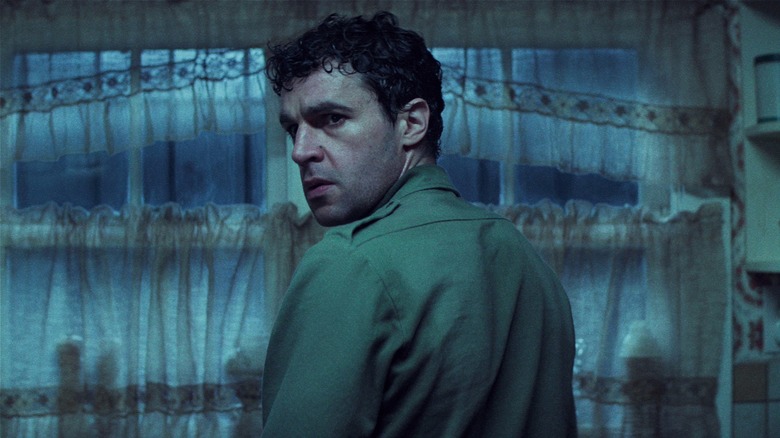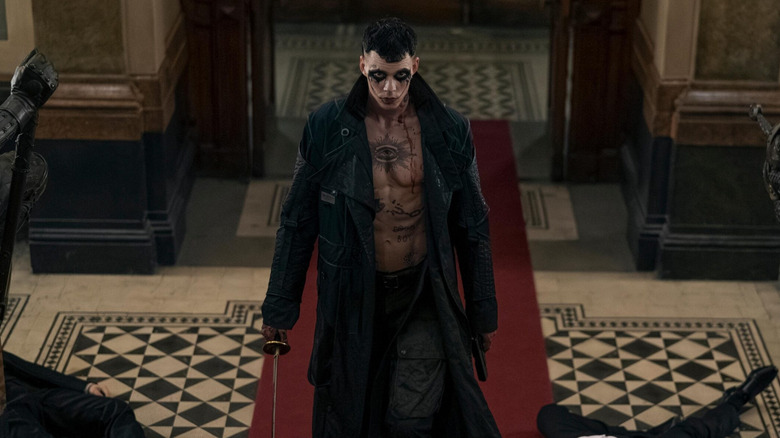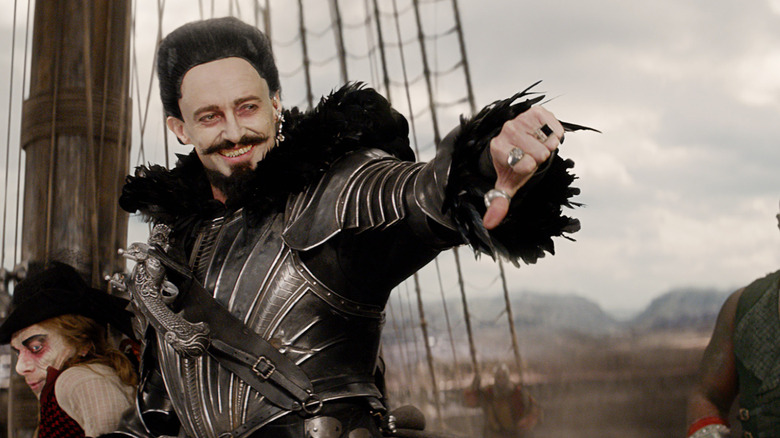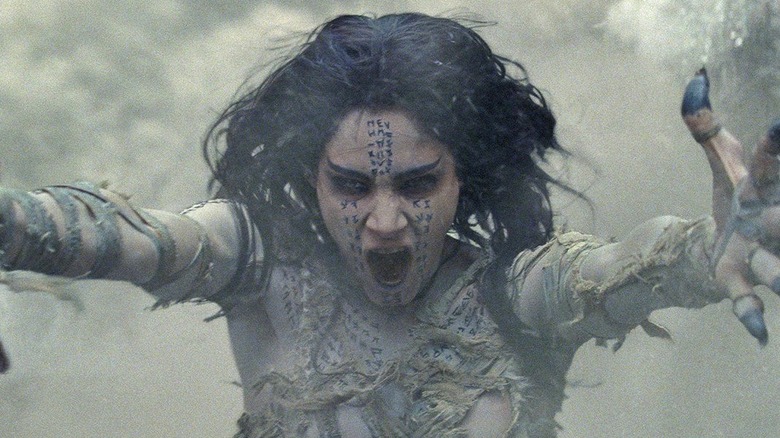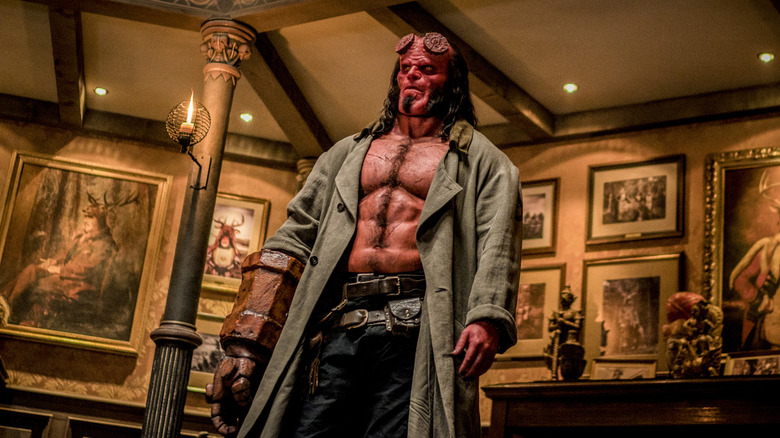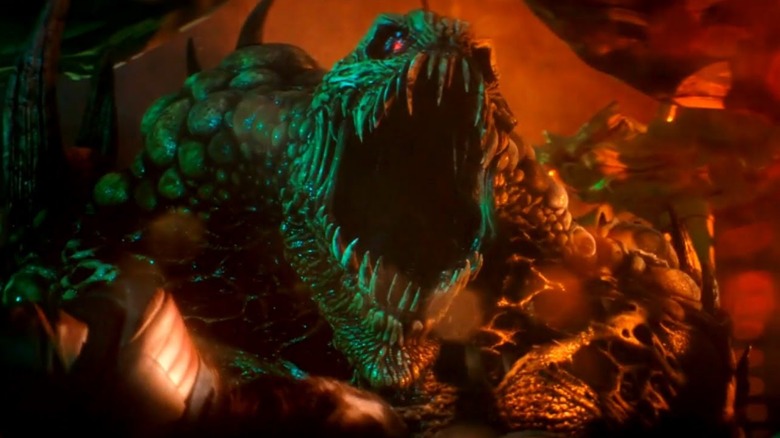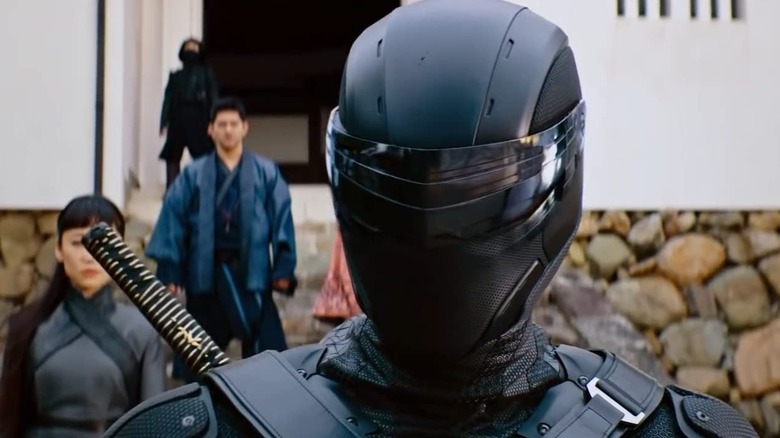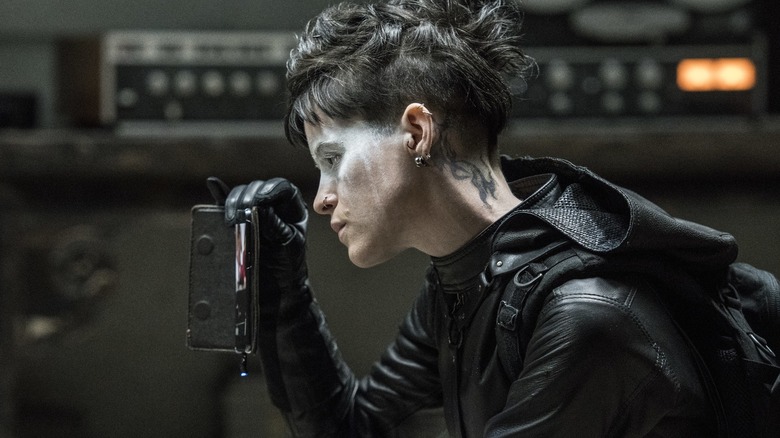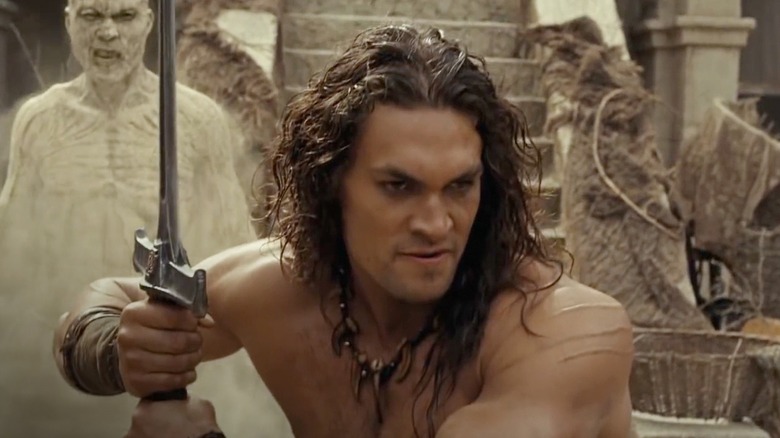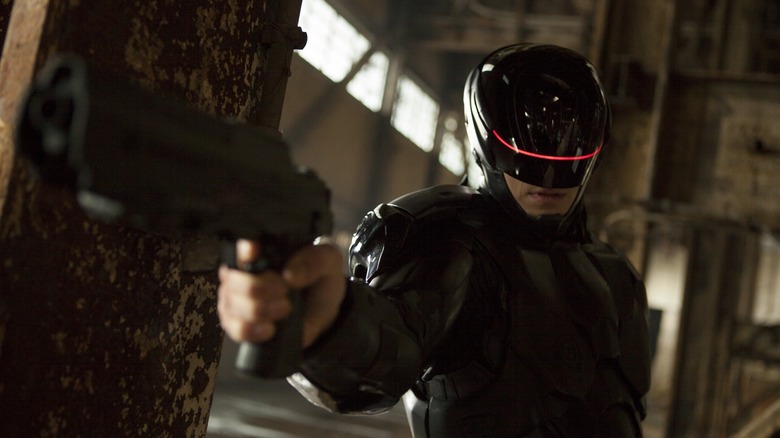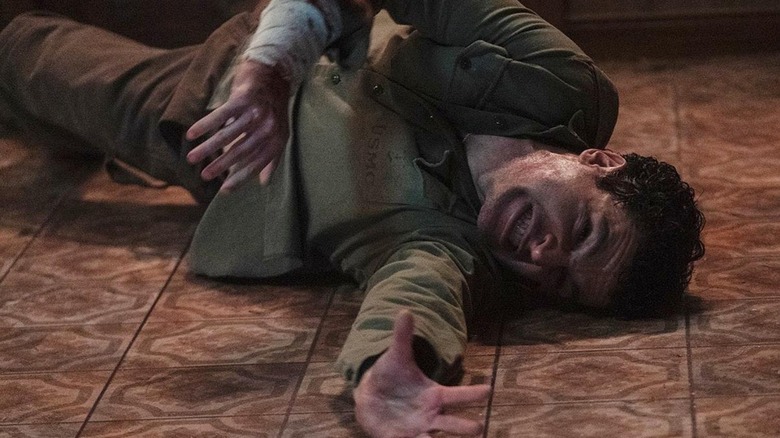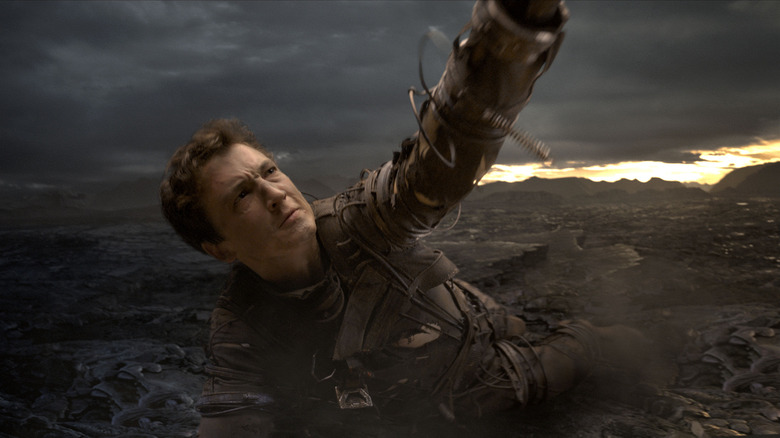Overhyped Reboots That Totally Bombed
Reboots are tricky to pull off. If done right, like "Spider-Man: Homecoming," they can unlock untapped potential in a character or franchise. The positive possibilities of these films are why folks believe that certain superheroes are in dire need of movie reboots. Badly made reboots, though, result in some truly chilling stuff for cinema fans. Done poorly, reboots can come off as the most craven cash grabs around, retreads of the past that irritate audiences and sully once-beloved brand names. There are such devastating consequences to failing at a reboot that Hollywood has shifted away from this mold (for movies, at least) and moved toward legacy sequels that build on instead of reinventing already successful works. For proof of what happens when a reboot project goes sideways, just look at this list of overhyped films that totally bombed in their respective box office runs.
All of these films were preceded by months (in some cases, years) of hype and marketing that promised audiences something special. Most arrived in theaters accompanied by excessive fanfare, yet that couldn't stop any of them from taking their place among the biggest box office flops of the last 15 years. Different factors led to each movie's grisly financial demise. Some were taken down by dismal reviews, while others simply couldn't escape the shadows of their predecessors. Still others were extensions of franchises that had already been beaten to death too many times. Whatever led to their box office fate, these overhyped reboots are truly haunting cautionary tales.
The Crow (2024)
2024's "Crow" remake languished in development for ages, going through filmmakers and leading men at an alarming pace. In its earliest days, producer Ryan Kavanaugh promised that this 21st-century "Crow" would emulate "Batman Begins" in style and scope. Over a decade later, the project's eventual director, Rupert Sanders, would grease the marketing wheels on this new "Crow" by claiming that it was more of an indie film than a traditional blockbuster. In other words, fans of unorthodox arthouse cinema were encouraged to buy their "Crow" tickets ASAP. Leading man Bill Skarsgård, meanwhile, alleged that the movie's ending was overhauled to open the door for sequels. "The Crow's" various financiers were confident this film would become a new superhero movie franchise, much like how the Brandon Lee "Crow" film inspired a deluge of follow-ups.
However, even 15-plus years of news headlines, eye-catching comments from the director, and a cliffhanger ending weren't nearly enough to convince people to see "The Crow" in theaters. In its worldwide run, the ill-fated reboot only grossed $24 million on a $50 million budget, a catastrophic result that immediately silenced all murmurs of sequels. Longtime fans just didn't want to see a "Crow" movie that didn't involve Brandon Lee's version, while folks oblivious to the original "Crow" found the movie's marketing unengaging. Whether it was courting newcomers or die-hard fans, the movie failed on all fronts. These disastrous results make "The Crow" an obvious example of a reboot that failed to take flight.
Pan
The supreme confidence Warner Bros. had in "Pan" was made apparent by the feature's initial mid-July release date. That's the same corridor Warner Bros. dominated from 2007 to 2013 with titles like "The Dark Knight," three of the final four "Harry Potter" features, and "Inception." If Warner Bros. was launching a tentpole in mid-July, then the studio clearly saw it as a massive deal.
The first "Pan" trailer launched over Thanksgiving 2014 alongside other major trailer debuts for "Star Wars: The Force Awakens" and "Jurassic World." Being placed in such incredibly prolific company suggested the grand aspirations Warner Bros. had for this Joe Wright-directed fantasy film, even if its release date was ultimately delayed. Before it eventually bowed on October 9, 2015, Warner Bros. reportedly spent an eye-popping $125 million promoting the title to worldwide audiences. All eyes were on "Pan" to see if it could become the studio's equivalent to Disney's 2010 live-action "Alice in Wonderland."
However, despite extensive marketing efforts that included takeover events in locations like London and Mexico City, "Pan" was a massive box office dud. Its global box office total reached $128.3 million (only slightly ahead of "Wonderland's" three-day domestic debut) despite costing $150 million to produce. While Warner Bros. went into overdrive trying to sell the project to people, aspirations of "Pan" being the next "Inception" or "Harry Potter" were never going to come true. There are just too many "Peter Pan" movies out there, and this one wasn't nearly good or distinctive enough to stand out from any of them.
The Mummy (2017)
2017's "The Mummy" reboot wasn't just a movie; it was intended to launch a wider universe that would change Universal Pictures forever. This Alex Kurtzman directorial effort was the much-hyped launch of the Dark Universe, a Marvel Cinematic Universe-inspired series of movies that would be adapted from the Universal Monsters library. A critical title for Universal, "The Mummy" even secured the participation of mega-movie star Tom Cruise. With the "Mission: Impossible" lead aboard, "The Mummy's" producers hoped audiences would perceive the inaugural Dark Universe feature as a must-see cinematic event. Weeks before "The Mummy" was set to open, a photo involving Cruise, "Mummy" performer Sofia Boutella, and other future Dark Universe cast members was unveiled to the public, an image that was intended to solidify "The Mummy" as the cornerstone of a massive, star-studded cinematic franchise.
As with so many attempts at launching a cinematic universe, though, this one cratered at the box office. Worldwide, "The Mummy" only took in $410 million worldwide on a budget that allegedly topped out at $195 million, not including marketing costs. That $410 million figure was only slightly better than "The Mummy: Tomb of the Dragon Emperor's" worldwide gross from nine years earlier, and that's before taking inflation into account. While Universal and Kurtzman were enamored with the idea of "The Mummy" spawning an avalanche of sequels and spin-offs, nobody stopped to inquire whether audiences really wanted a moodier, edgier take on the "Mummy" mythos. It turned out they did not, as the film failed to entice horror fans, Universal Monsters devotees, or even Tom Cruise followers. Focusing pre-release hype on a potential future for all of the Universal Monsters just underscored to audiences how little "The Mummy" had to offer.
Hellboy (2019)
The 2019 Millennium Films reboot of "Hellboy" had to overcome daunting comparisons to Guillermo del Toro's two beloved movies. How could this redo of the property justify its existence to audiences? The answer was to emphasize in pre-release marketing that this would be a grisly, R-rated version of the demonic hero. Key creative folks involved in the project, like its star, David Harbour, kept emphasizing that the movie would tremendously satisfy people who love graphic violence. Hellboy creator Mike Mignola's involvement in the project was also constantly cited in an attempt to certify the reboot's bona fides.
Despite its differences from the previous "Hellboy" films, Millennium/Lionsgate's high hopes for the feature never wavered. The studio's marketing campaign, particularly trailers set to '80s rock songs like "Mony Mony," was evocative of those that had been unleashed for titles like "Suicide Squad," just the kind of box office hit Lionsgate wanted "Hellboy" to emulate. All this hype, though, didn't come close to helping it out at the box office. Worldwide, the $50 million-budgeted feature only grossed $54 million, a tremendous failure that didn't come close to matching the original "Hellboy" features' box office success.
In the end, "Hellboy's" pre-release hype failed to explain to viewers why this specific reboot was either necessary or a must-see. Reminding people of other superhero films and distancing the film from del Toro's franchise-establishing features wasn't enough. All these gravely miscalculated attempts at hyping up "Hellboy" just sealed its eventual grisly box office fate.
Resident Evil: Welcome to Raccoon City
After six "Resident Evil" movies, Sony's reboot of Paul W.S. Anderson's popular horror saga needed to do something drastic to get people's attention. The answer for those involved in 2021's "Resident Evil: Welcome to Raccoon City" was to lean on the idea that this would be the film that finally faithfully adapted the original "Resident Evil" video games. The pre-release promotion for "Raccoon City" hyped up how much this fresh movie would take its cues from the franchise's earliest games. Entire featurettes were dedicated to emphasizing the fact that "Raccoon City" faithfully recreated shots from the source material. Finally, audiences would get to see their favorite "Resident Evil" characters faithfully represented on the screen.
Released as Sony's big Thanksgiving 2021 tentpole, "Welcome to Raccoon City" even tried to build up hype by having the film's director, Johannes Roberts, talk about his ambitions for potential sequels that would exploit even more "Resident Evil" lore. Alas, none of this was enough to save the reboot at the box office. While previous "Resident Evil" movies had each topped anywhere from $100 million to $300 million at the box office, "Raccoon City" stalled out at $42 million globally on a $25 million budget. Very quickly, the franchise moved on to a short-lived Netflix show and a planned 2026 reboot from director Zach Cregger. Endless pre-release headlines about "Welcome to Raccoon City's" faithfulness to "Resident Evil" games didn't move the needle when it came time for its box office run, proving that it takes more than just fidelity to old video games to save an unappealing feature.
Snake Eyes: G.I. Joe Origins
After an eight-year absence from the big screen, 2021 saw the "G.I. Joe" franchise return as a live-action movie property with "Snake Eyes: G.I. Joe Origins." This project was, as headliner Henry Golding put it, "a stepping stone into the G.I. Joe universe." The film already had lots of pressure on it to rebirth the "G.I. Joe" property on the silver screen — and then COVID-19 upended the entire entertainment landscape.
The global health crisis pushed "Snake Eyes" from an October 2020 premiere to a July 2021 launch, which made it one of the first big tentpoles to debut theatrically after COVID-19 shut down movie theaters. Now, an extra layer of pressure was on the title, which was also designed to build momentousness for "G.I. Joe" owner Hasbro. "Snake Eyes" was announced in early 2021 as a key piece in the toy manufacturer's larger media empire plans, while a major "Snake Eyes" crossover with Fortnite was also revealed, one of Hasbro's first collaborations with the hit video game.
With the "G.I. Joe" movies, Hasbro's corporate ambitions, and movie theaters all needing "Snake Eyes" to excel, it seems almost inevitable in hindsight that the film would come up short. A series of baffling creative decisions (including having the fan-favorite character speak and eschewing his iconic costume until the end credits) contributed to a toxic reception for the film that sank its box office chances. With a sub-$35 million worldwide gross, "Snake Eyes" disappointed in an epic way.
The Girl in the Spider's Web
2011's "The Girl with the Dragon Tattoo" proved a solid moneymaker while garnering five Oscars, including a best actress nod for Rooney Mara. But despite Mara and director David Fincher's passion for the franchise, follow-ups never materialized. Instead, the revamped Sony Pictures regime that took over in 2015 announced in 2017 a reboot-slash-sequel that would kick off by adapting the fourth novel in the series, "The Girl in the Spider's Web."
This feature replaced Mara with Claire Foy as Lisbeth Salander and launched its marketing campaign in June 2018 at the height of summer moviegoing season. This reboot was dubbed the biggest film project to date for both Foy and director Fede Alvarez by major media publications, and Sony's then-ongoing box office woes meant that all eyes were on "Spider Web" to see if it could finally create an ongoing Salander franchise for the studio.
While the high sales figures for "The Girl in the Spider's Web's" literary source material meant that people were aware of this story, the box office results for Alvarez's directorial effort clearly indicated people weren't really interested in seeing it on the big screen. Months of promotion involving Foy, who was hot off of winning a best actress Emmy for Netflix's "The Crown," weren't enough to keep "The Girl in the Spider's Web" from a disastrous box office haul. Grossing $34.98 million worldwide (including just $14.82 million domestically) on a $43 million budget, Sony really should've just pursued straightforward sequels to the 2011 film.
Conan the Barbarian
Before he was Aquaman, Lobo, or surrounded by flint and steel in "A Minecraft Movie," Jason Momoa was Conan, Robert E. Howard's Cimmerian berserker. The fantasy icon was reborn in 2011 as an R-rated action hero inhabited by Momoa, with other major actors like Stephen Lang, Ron Perlman, and Rachel Nichols, among others, taking on major parts in the aptly titled "Conan the Barbarian." Though Arnold Schwarzenegger previously played the character on the big screen, the hope was that Momoa could be this generation's definitive Conan and go on to headline endlessly lucrative blockbuster sequels. In the months leading up to its bow, "Conan the Barbarian" was dubbed one of summer 2011's most anticipated motion pictures, while previews of the moviegoing season highlighted it as one of the year's must-see action movies.
"Conan" being released in digital 3D in a post-"Avatar" world was clearly meant to signify to moviegoers that this was a must-see blockbuster event rather than just a run-of-the-mill action movie. However, without Arnold in the lead role, audiences didn't care much about the musclebound fantasy hero. "Conan the Barbarian" only grossed about $63 million worldwide on a massive $90 million budget. Though it had the costs and pre-release marketing campaign of a gargantuan tentpole, the film's ultimate box office haul was more reminiscent of Nic Cage's ill-received "Season of the Witch." Unsurprisingly, no further "Conan" adventures emerged. As for Momoa, he moved on to greener cinematic pastures — and significantly better box office results.
RoboCop (2014)
The original "RoboCop" is one of the most beloved sci-fi films of all time, so rebooting it would be a daunting task that meant living up to one of the great pieces of satirical cinema. That's just what director Jose Padilha and company attempted with 2014's "RoboCop," which saw Joel Kinnaman take over the role originated by Peter Weller in 1987. To try and get ahead of potentially negative buzz, Sony/Columbia Pictures started its viral marketing techniques for "RoboCop" two whole years before its February 2014 theatrical release. As its debut drew closer and closer, other major marketing efforts, including a Super Bowl commercial, were implemented to increase the omnipresent buzz surrounding this reboot. It was a promotional blitzkrieg that seemed to be fighting off the possibility that a "RoboCop" reboot was superfluous by putting the new version of the character everywhere.
Alas, no amount of tremendous marketing power and buzz over the new "RoboCop" could save this feature from a middling box office fate. Grossing just $243 million worldwide on a $120 million budget, "RoboCop" didn't make nearly enough to revive the franchise long-term. There are endless reasons why the franchise reboot stumbled, with "RoboCop" star Joel Kinnaman even having his own theory about why it failed. The biggest problem, though, was that so many people were content with the original, R-rated "RoboCop" that a PG-13 remake was unnecessary. No viral marketing campaign, no matter how prolonged, could change that.
Wolf Man
The hype for 2025's "Wolf Man," a reboot of the classic Universal horror film "The Wolfman," was rooted in another 2020s Universal Monsters update. Writer/director Leigh Whannell had previously delivered the inspired thriller "The Invisible Man," which set a high bar for "Wolf Man" to live up to. Inevitable pre-release discussion over whether or not Whannell's "Wolf Man" could live up to his "Invisible Man" was paired with an avalanche of discourse surrounding the leaked appearance of the movie's titular monster. A Universal's Halloween Horror Nights event appeared to accidentally reveal what this new Wolf Man looked like, a radical approach to the hairy creature that caused nothing short of an uproar. These critiques grew so loud that Whannell felt forced to respond to them while promoting "Wolf Man," assuring fans that the haunted attraction's design was not, in fact, accurate.
Combine all that with the usual massive marketing campaign that accompanies any modern Universal Pictures release, and "Wolf Man" entered theaters in January 2025 with wildly varying levels of hope at its back. "Wolf Man" producers likely prayed all the chatter would at least drive people to check out the horror film and see the true creature design, but, instead, it merely overshadowed the final film. Not only did "Invisible Man" fans not show up, horror movie fans in general didn't turn out for this new vision of "The Wolfman" either. In the end, "Wolf Man" only grossed $34.9 million worldwide on a $25 million budget. Who knew Universal's werewolf reboot would go out with such a whimper?
Fantastic Four (2015)
A year before Josh Trank's "Fantastic Four" hit theaters, producer Simon Kinberg began hyping up the tentpole as the ultimate comic book movie by promising it would pay homage to every era of the characters' Marvel Comics history. Meanwhile, 20th Century Fox tried to get the film some extra juice by signaling that "Fantastic Four" could lead to larger crossovers between the titular quartet and the "X-Men" movie franchise. In other words, Fox's Marvel heroes were now entering their own "bigger universe," as Samuel L. Jackson's Nick Fury once described the MCU. All of these elements were designed to drum up even more excitement for a feature that was generating tons of buzz and attention ahead of its debut. There was so much buzz, in fact, that the teaser trailer briefly held the record as the most-watched 20th Century Fox trailer ever.
Just a few weeks before "Fantastic Four's" release, Fox put the promotional pedal to the metal through events like a San Diego Comic-Con Hall H panel where the "Fantastic Four" and "X-Men" actors took the "biggest superhero selfie ever." All of these maneuvers, particularly associating "Fantastic Four" with Fox's beloved "X-Men" features, were meant to make this reboot seem like a must-see and erase general moviegoer memories of the franchise's previous titles. Ultimately, however, none of this promotional effort positively impacted the final product, as the filming of the project was such a total mess that no amount of marketing could overcome its shortcomings. Grossing $167 million worldwide on a $120 million budget, this was one reboot whose financial endpoint was anything but fantastic. Surely all of the Fantastic Four's comic exploits should've culminated in a more lucrative outcome.
